DUBAI: Spain’s minister of foreign affairs has indicated that if Europe continues to waver in its support for the Palestinians, “as a sovereign country” Spain would “take its own decisions.”
Jose Manuel Albares also said that peace in the Middle East can only be achieved through the creation of a Palestinian state, linking Gaza and the West Bank, with East Jerusalem as its capital.
The Spanish diplomat, who has been serving as minister of foreign affairs, European Union and cooperation since 2021, made the remarks during an appearance on the Arab News current affairs show “Frankly Speaking.”
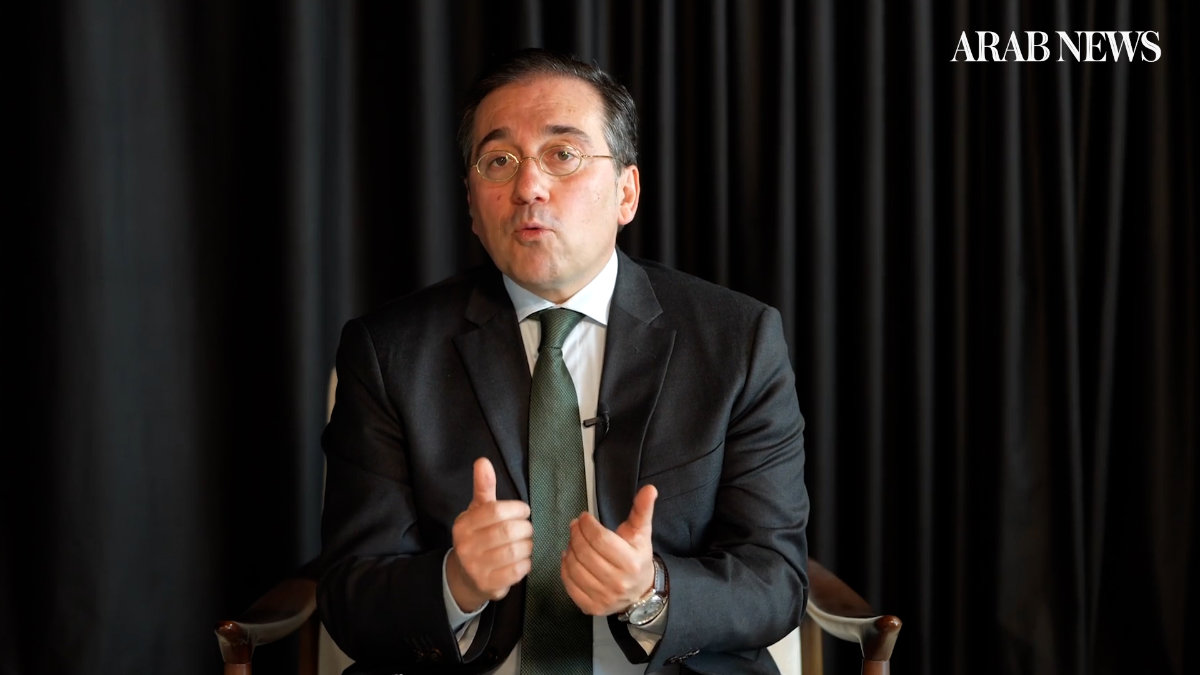
Spanish Foreign Minister Jose Manuel Albares on Frankly Speaking. (AN photo)
According to Albares, while the 27 member states of the European Union “all want peace” in the Middle East, there were “nuances” in the way they saw this materializing.
For Spain, however, the position is “very clear:” It wants to see an immediate halt to the Israel-Hamas conflict, unrestricted humanitarian access to the Gaza Strip, and the implementation of the “two-state solution.”
“We’re calling for a permanent ceasefire, the immediate release of hostages, the immediate access of humanitarian aid, and for a peace conference that will be the framework (for the) implementation of the two-state solution,” Albares said.
“In the end, we all know that as long as the Palestinian people do not have a state, there will be no stable Middle East.
“And we all know the real solution for this situation in the Middle East and for a definitive peace is a state with the West Bank and Gaza under one single Palestinian authority that is connected by a corridor with an exit to the sea and with the capital in East Jerusalem.”
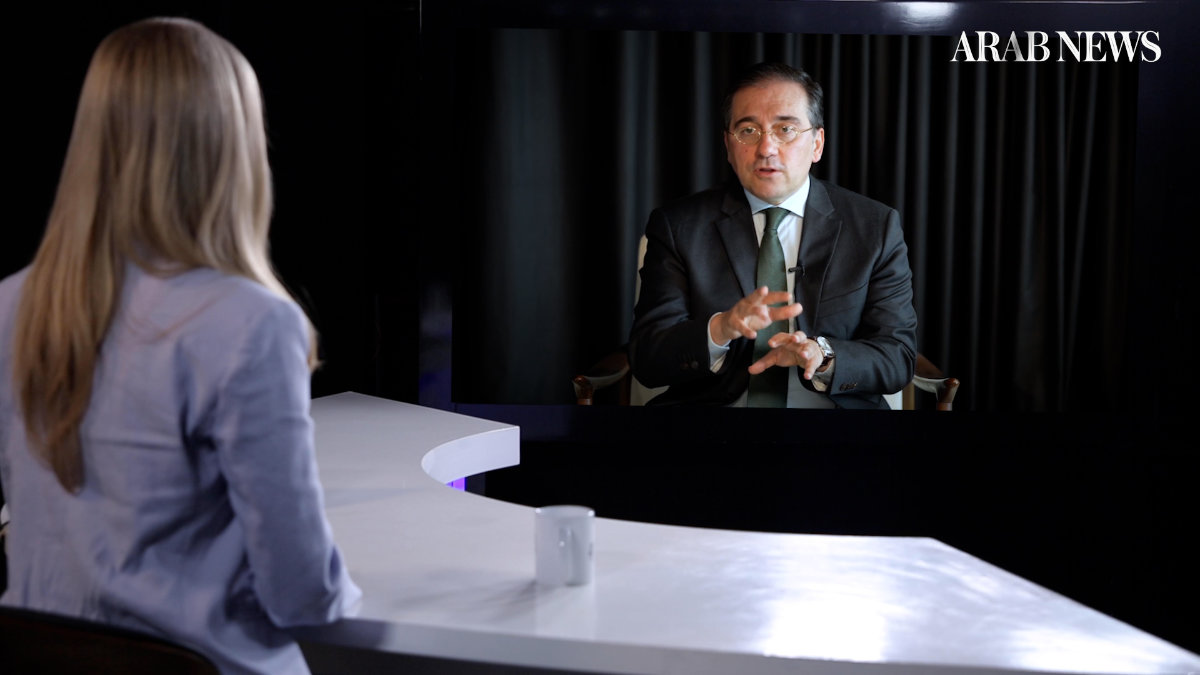
Appearing on “Frankly Speaking,” Spanish Foreign Minister Jose Manuel Albares said that while the 27 member states of the European Union “all want peace” in the region, there were “nuances” in the way they saw this materializing. (AN photo)
Describing the solution as “fair and just” for the Palestinian people, Albares said the two-state model offered Israel the “best guarantee” of achieving domestic security and of avoiding a wider regional conflagration.
However, in his role coordinating Spain’s engagement with the European Union, Albares acknowledged that the proposal was still in the “dialogue” stage, as the bloc sought a way to move forward as a collective unit.
He also noted the “growing concern” in the Global South — a term often used to denote the world’s developing economies — over the bloc’s dithering response to the crisis in Gaza compared to its firm alignment on Russia’s invasion of Ukraine.
“That’s why it’s so important, and I always explain it to my European colleagues, that we maintain the same position: To follow the UN Charter and its principles, whether it’s Ukraine, on which we have a clear position, a very clear position,” Albares told Katie Jensen, the host of “Frankly Speaking.”
“Any country has the right to defend itself from a terrorist attack, Israel as well, but you must do it in compliance with international humanitarian law.
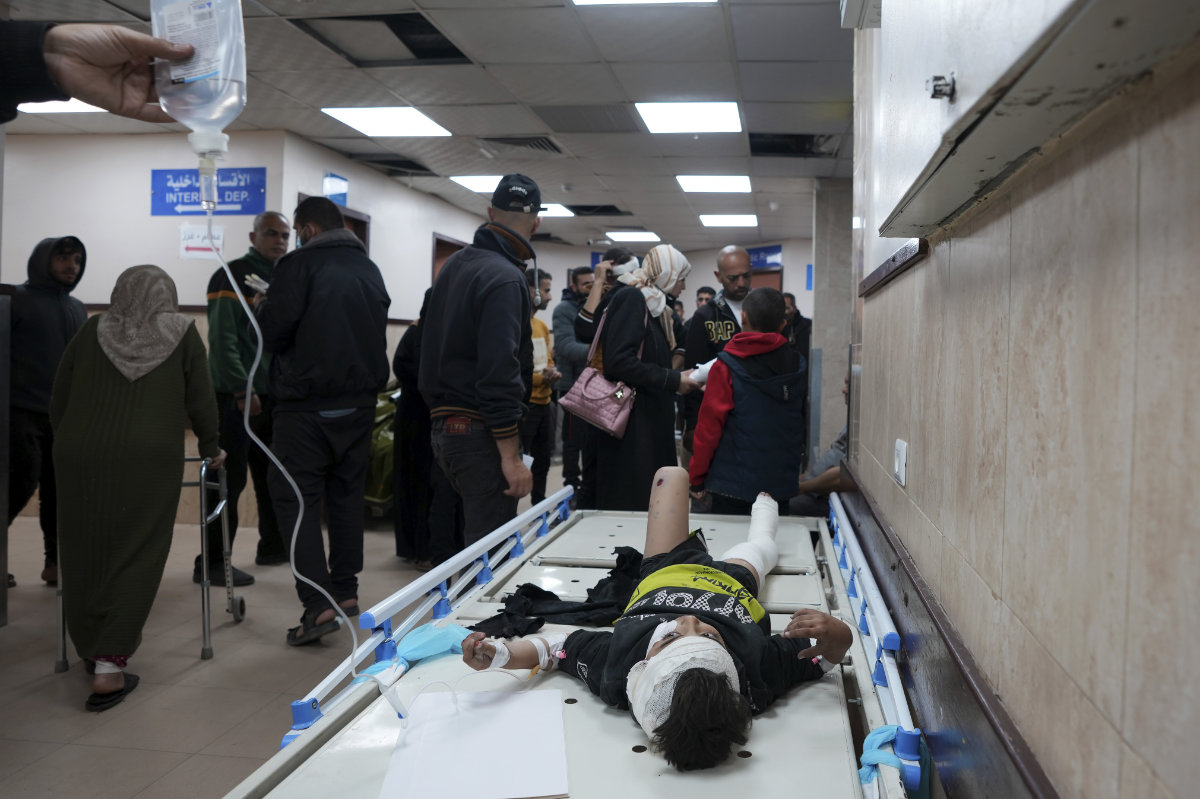
Palestinians wounded in the Israeli bombardment of the Gaza Strip are treated in a hospital in Deir al Balah, Gaza Strip, on Feb. 10, 2024. (AP Photo)
“There must be a difference between terrorist targets and bombing hospitals, schools, places of prayer, UN headquarters. Refugees are the same. It doesn’t matter the color of their skin, their religion, their sex, they are all the same and they all deserve our protection.”
Speaking to Arab News from Riyadh, during an official tour of three Gulf countries, Albares said Spain shared the opinion of his Arab hosts, with discussions having inevitably turned to the conflict in Gaza and its wider regional ramifications.
Albares praised his Saudi counterpart, Prince Faisal bin Farhan Al-Saud, for his “incredible role” in working towards peace in the region.
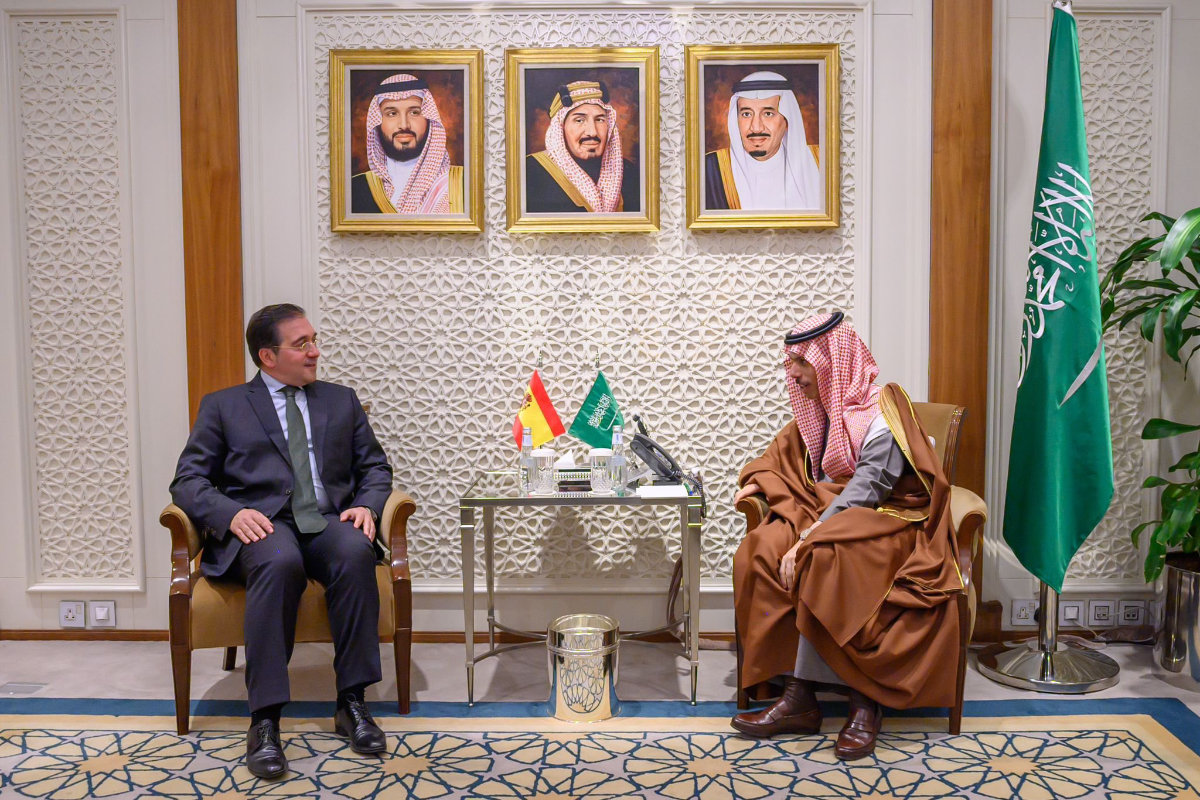
Spanish Foreign Minister Albares praised his Saudi counterpart, Prince Faisal bin Farhan Al-Saud, for his “incredible role” in working towards peace in the region. (Supplied)
“We needed a great moment of Euro-Arab unity and we have discussed joining forces to make sure definitive peace comes back to the Middle East,” he said.
“This is what we are calling for and we will not stop calling for that. And my tour in the region, in Riyadh, in the Emirates, it’s carrying this message and in the medium and long term we need the state of Palestine.”
In the interim, Albares said the most pressing need for Gazans is an increase in the amount of humanitarian aid permitted to enter the besieged Palestinian enclave.
“We are not going to stop calling for a permanent ceasefire. A permanent ceasefire and the immediate release of hostages and immediate access of humanitarian aid is what we need in the very short term,” he said.
Aid deliveries, already reduced to a trickle by onerous Israeli border checks, have been further hampered by recent allegations lodged against staff working for the UN Relief and Works Agency, UNRWA, which caters for Palestinian refugees.
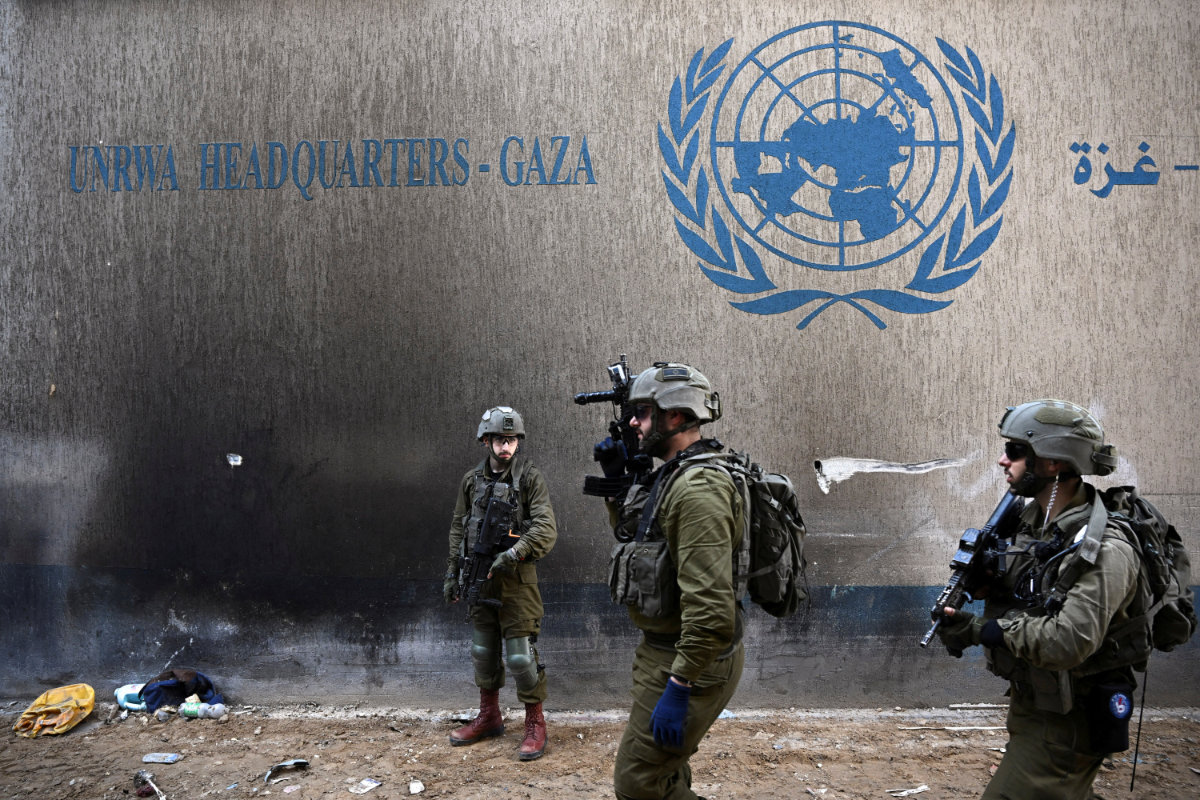
Israeli soldiers operate next to the UNRWA headquarters in the Gaza Strip Feb. 8, 2024. (Reuters)
According to evidence shared with the UN by Israeli intelligence, 12 members of UNRWA staff in Gaza actively participated in the Oct. 7 Hamas-led attack on southern Israel, which resulted in the death of 1,200 and the kidnap of 240, sparking the current conflict.
In response to the allegations, the US and other major UNRWA donors suspended their funding for the agency, which could be forced to halt its operations throughout the region by the end of the month unless donations are restored.
Asked whether he believed the allegations were true, or whether the funding suspensions were justified, Albares said that 12 people out of 30,000 staff, none of whom had any connection to UNRWA’s leadership, was a “very small number.”
“There are allegations against 12 people and we take this very seriously and we are looking at the conclusion of the inquiry,” he said, referring to the UN agency’s own internal investigation.
“But UNRWA is indispensable. There is no substitute for UNRWA. They are taking care of millions of refugees in Gaza. And in many other places — Lebanon, in Jordan, the West Bank — and what they do in Gaza is absolutely fundamental.”
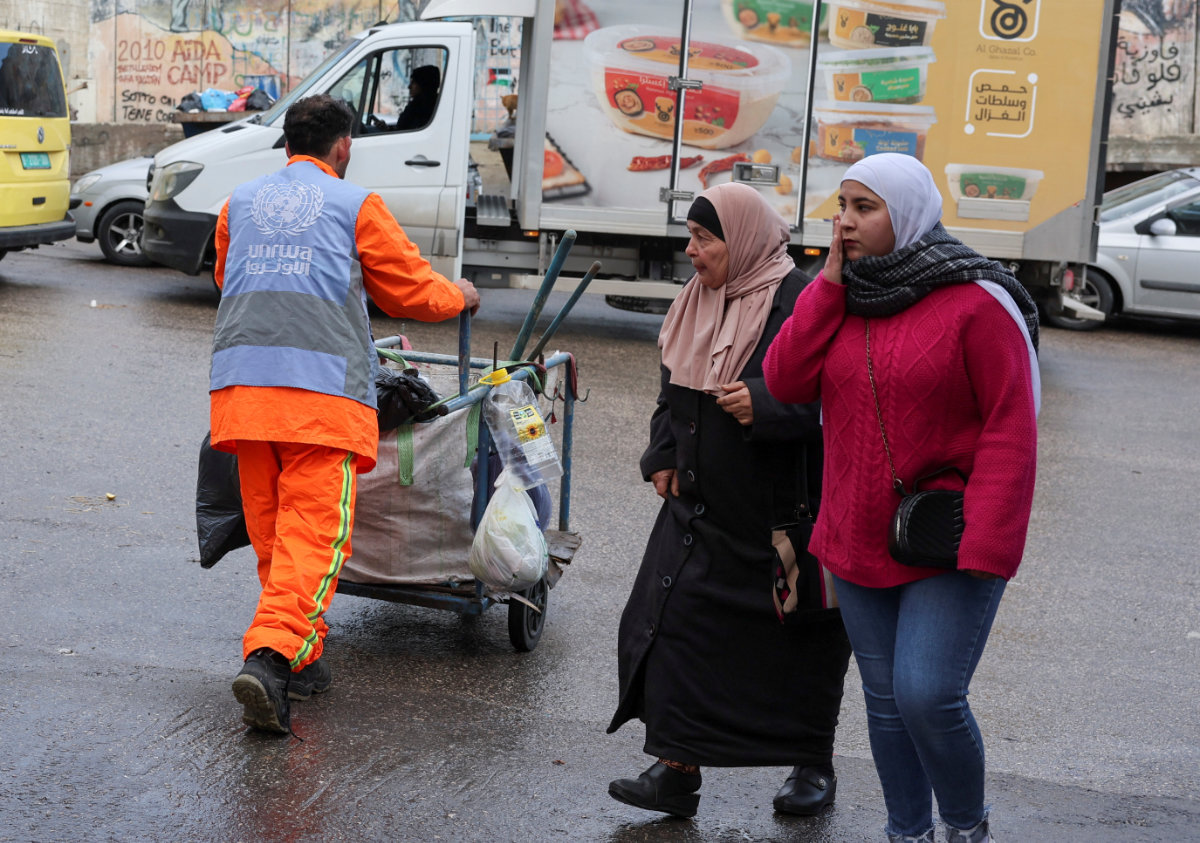
Palestinians walk past a UNRWA worker in the Aida refugee camp in Bethlehem in the Israeli-occupied West Bank on February 5, 2024. (REUTERS)
Given the essential role played by UNRWA, Albares said millions of people who depend on its support would go unfed unless funding is restored. That is why Spain intends to up its UNRWA contribution to help stave off the agency’s collapse.
“They give food and emergency aid to refugees, so, if they fail, if they are not sufficiently funded from one day to the other, they will not be able to feed those people,” Albares said.
“This is why we have decided to increase our contribution to around 3.5 million euros, to make sure that UNRWA will be able to function, and this is what I am explaining to all of my European colleagues.”
Spain is not alone among European nations in bolstering its support for UNRWA. Ireland and Norway have likewise renewed their commitment to the agency.
However, these nations alone cannot make up for the huge shortfall created by the suspension of US funding, which had contributed $300-400 million annually. Without this funding, Albares said the region was “heading toward a real humanitarian catastrophe.”
“We are already there. Almost 30,000 Palestinians, civilians, dead. It’s a catastrophe. But here we are talking about something unthinkable — hunger in Gaza,” he said.
“And we can avoid it if we continue giving sufficient funding. That’s why we are increasing. We are showing commitment to the Palestinian refugees in Gaza.”

Appearing on “Frankly Speaking,” Spanish Foreign Minister Jose Manuel Albares said that while the 27 member states of the European Union “all want peace” in the region, there were “nuances” in the way they saw this materializing. (AN photo)
Mindful of the potential misuse of donations, Albares said Spain has a “very tough screening” process for any country to which it is sending aid, adding that the money going to Palestine is “well used.”
He implored countries to restore their donations, pointing out that UNRWA and the UN have not tried to “hide anything.”
“They have their own investigation and they’ve also called for an independent investigation, so, I think they are showing goodwill. Let’s wait until those investigations are carried out,” he said.
“Meanwhile, let’s follow what the secretary-general of the UN, Antonio Guterres, has made an appeal for. Let’s continue funding UNRWA.”























